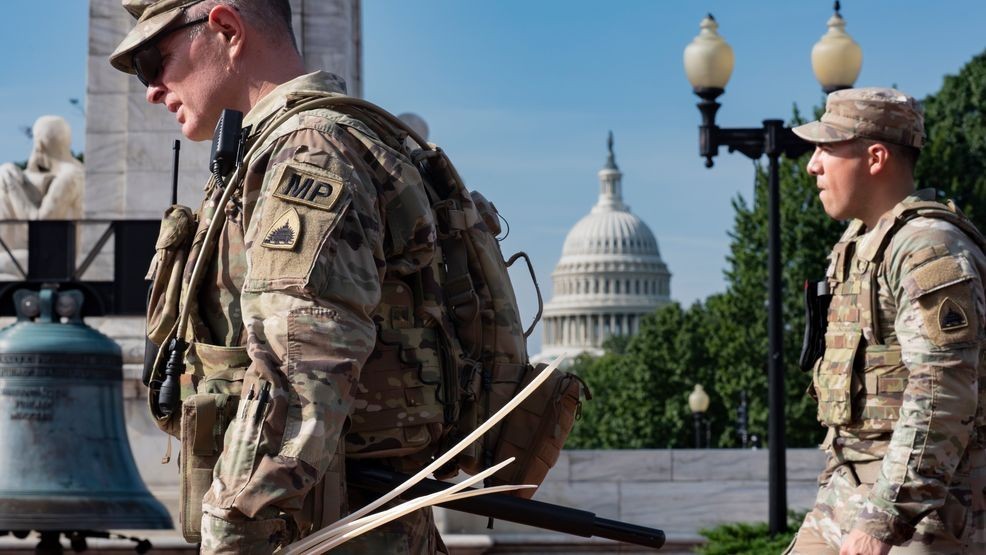SALT LAKE CITY (KUTV) — More than 1,000 National Guard members could mobilize in 19 states, including Utah, to help the Department of Homeland Security with President Donald Trump’s nationwide immigration enforcement push, Pentagon officials told FOX News.
The outlet obtained documents saying deployments would begin in August and run through mid-November. According to the outlet, the Guard would mobilize in Alabama, Arkansas, Florida, Georgia, Idaho, Indiana, Iowa, Louisiana, Nebraska, Nevada, New Mexico, Ohio, South Carolina, South Dakota, Tennessee, Texas, Utah, Virginia, and Wyoming.
Gov. Spencer Cox addressed the issue during his monthly news conference, saying Utah has not received direct communication from Washington about potential involvement.
MORE | National Guard troops in DC to begin carrying weapons under Trump’s crime crackdown
“As a dual-authority state, like others, the federal government does have the opportunity to call up the National Guard. The president has that authority,” Cox said. “What we’ve said from the very beginning is this: we are willing to work to support the efforts to remove people who are here illegally. However, with a couple caveats.”
Cox said Utah troops would only serve in support roles.
“Our National Guard will not be putting hands on people, will not be arresting people. That is not the role of the National Guard, and we would not allow that to happen,” he said.
He added that Utah has previously offered help with transportation since the state does not have an ICE facility. Moving detainees, he said, often pulls Homeland Security staff away from processing and other responsibilities.
Cox outlined two conditions for participation: The Guard would only assist with support functions, and the federal government must cover all costs.
“That’s where we would be able to help. Condition number one. Condition number two is that the federal government has to pay for this. It can’t come out of state funding,” Cox said. “We’re in active communication with the federal government, and I think that’s true of most states.”
Utah National Guard officials later confirmed they have received a request from the Department of Defense seeking volunteers.
“Yes, we can confirm Utah National Guard has received a request from the Department of Defense through normal channels for volunteers for administrative and clerical support for Department of Homeland Security and U.S. Customs and Immigration Enforcement,” said Lt. Col. Chris H. Kroeber, public affairs officer for the Utah National Guard.
He said the Guard does not yet know what that support will involve and is in the “question-and-answer stages,” working through logistics. The request still requires approval from Cox, though Kroeber said the expectation is that the governor will sign off. Funding, he added, would come from the federal government.
When asked if he would approve deploying Utah troops to other states, Cox said he does not expect that scenario.
“We’ve had the need to deploy the National Guard here before, when we’ve had riots and property damage in Utah when lives were at risk. We’re hoping we don’t need to do that here,” Cox said. “Our job is to make sure we don’t need the National Guard in Utah.”
The issue was also discussed on this week’s Take 2 Podcast with Heidi Hatch, who raised questions about federal authority in Washington, D.C., and whether Trump could expand his efforts to other cities.
John Dougal, former state auditor, said he is uneasy with the trend of relying on the Guard for civilian matters.
“I have serious concerns, law enforcement is trained differently than the military. I hate the fact that we keep deploying the National Guard to this, that and the other,” Dougal said. “I think they have a certain duty they should respond to, and we should not deploy them on all sorts of other matters.”
Dougal also questioned Trump’s reach.
“When the president starts talking about other cities and other places, he doesn’t have the authority to do that,” he said.
Maura Carabello of the Exoro Group said she believes this move is more about showmanship than governance.
“He deploys the military and 48 hours later says ‘huzzah, problem solved, children are smarter in D.C.’ He will move on to his next victory because that is part of his story arc,” Carabello said.
She argued that the approach is not geared toward long-term solutions.
“He’s not about long-term sustainable solutions; he is about his legacy and what he can do for us, and so I don’t even think he’s looking at public policy. This is not a serious attempt to solve a problem,” she said.
___
